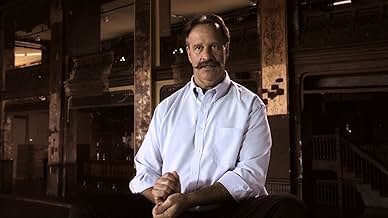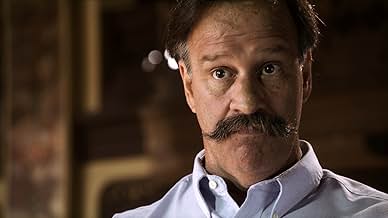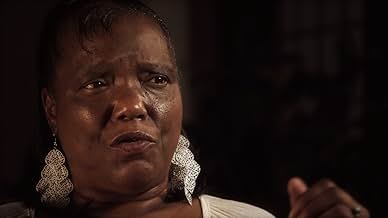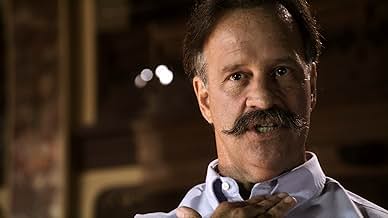IMDb रेटिंग
6.3/10
2.2 हज़ार
आपकी रेटिंग
अपनी भाषा में प्लॉट जोड़ेंAn experimental documentary that uses archival footage, interviews, and fictionalized scenarios to tell the story of the people around Jeffrey Dahmer, during the summer of his arrest in 1991... सभी पढ़ेंAn experimental documentary that uses archival footage, interviews, and fictionalized scenarios to tell the story of the people around Jeffrey Dahmer, during the summer of his arrest in 1991.An experimental documentary that uses archival footage, interviews, and fictionalized scenarios to tell the story of the people around Jeffrey Dahmer, during the summer of his arrest in 1991.
- पुरस्कार
- 1 जीत और कुल 2 नामांकन
Jeffrey Dahmer
- Self
- (आर्काइव फ़ूटेज)
कहानी
क्या आपको पता है
- ट्रिवियाWon the Milwaukee Film Festival's Cream City Cinema Grand Jury Award for 2012.
- गूफ़When Dahmer is watching the Chicago Pride Parade go by, there is a woman in the front row of spectators recording the event on her smart phone. This was supposed to be 1991.
- साउंडट्रैकStill Light
Performed by The Knife
फीचर्ड रिव्यू
Chris James Thompson's Jeff, a docudrama involving the interworkings of the Jeffrey Dahmer case, opens by establishing two different, vital points for a film like this to make. It has the medical examiner, Jeffrey Jentzen, assigned to the case of Jeffrey Dahmer state how many people have formulated different meanings behind what exactly a "disaster" is, and then has leading detective on the case, Patrick Kennedy, go into how as human beings we'd love to believe we'd react courageously in the face of tragedy or despair, but we can never be certain until it happens. He then goes on to state how as a devout Catholic, he was always thought that courage is fear that said its prayers.
All I can say is that fear can pray all it wants, but it could never have prepared itself for the horror Dahmer inflicted not only on a community but on a country as a whole. Jeff dives into three people, all of them deeply effected by Dahmer's actions in some way, and spliced in are scenes recreated to show Dahmer's day-to-day life, as mundane as it is, with the man in question played wonderfully by Andrew Swant. The three people, however, are not actors, and are here to share their depressingly grim accounts of their relationship with Dahmer. The medical examiner is Jeffrey Jentzen and the leading detective is Patrick Kennedy, as established, and but the third person was the most personally affiliated with the man and that is Pamela Bass, who was the next door neighbor to Dahmer in his apartment for many years.
The film explores how deeply this one unexplainable murder case completely changed the lives of three normal, innocent, law-abiding people and how they've gone on to better or further their lives based on this case alone. Pat Kennedy, easily the one with the biggest story to tell due to his explicit connection with Dahmer during the time of his arrest, conviction, and jail-life, goes into how when he first met the man, they talked in lengthy detail about religion and alcoholism. This was during the time that a skeleton was found in his refrigerator, so says Kennedy, who recalls his thoughts and mindset as he discovers there was not just one but six skulls found in Dahmer's refrigerator, among other severed body parts in containers, drums, and jars that lied throughout the home of Dahmer.
This is one of the most unique documentary films I've ever seen, with a style very similar to that of Richard Linklater's Bernie, which featured polarizing performances by Jack Black, Matthew McConaughey, and Shirley McClaine. It takes the same kind of mockumentary approach that film did, featuring reenactments and authentic interviews from various townspeople who knew the suspect in question. However, this film has less of a mock-narrative consistency than Bernie, with the scenes featuring Dahmer involving little dialog and emphasizing on the mundane activities of the man behind washed-out cinematography and often low-key music. This is the stylistic side of the picture, which is very innocent and unobtrusive to its central focus. Next to Quentin Dipeux's Wrong, this is easily some of the best cinematography and stylistic merits a film has had this year, only this time, the traits are embodied in a film that is much more watchable and clear in its tone.
Jentzen goes into the grim details of investigating and gutting the apartment, and being put to the painstaking task of identifying all the bodies removed from the apartment. It was a tireless project, seeing as how not only were the bodies dismembered and mutilated, but they had begun decomposing, leaving much of the reliance on small facial details and anatomy structure to identify them. Finally, Bass goes into how she was effected simply for being her neighbor. The apartments and their always reeked of death for weeks on end, and she and her building were the target of public scrutiny and attention, with numerous people asking if they could come in to sit on couch Dahmer gave her or touch a glass Dahmer once drank out. We begin to question that, besides Dahmer, who else was sick in this whole equation.
There is no better way to describe Jeff than a complete film than a subtle and low-key crime drama. Everything about it is an exercise is subtle, minimalist filmmaking that accentuates drama, uncertainty, and impending doom with true craft, from a filmmaker who clearly has a long road to travel on before he can even give us, what I believe, is half of what he wants to say. If there's any film that should be shown to film students as a look at what a first-time auteur looks like, this is it.
One of the best and most thought-provoking scenes is the scene where Jentzen reveals that he doesn't go to horror movies and can't see why people would want to. The last horror film he saw was The Exorcist, likely in its original theatrical run in 1973. He doesn't feel the need to watch anymore. Why would he? He lived a horror film and there's no "stop" button on his.
Starring: Andrew Swant, Pamela Bass, Jeffrey Jentzen, and Pat Kennedy. Directed by: Chris James Thompson.
All I can say is that fear can pray all it wants, but it could never have prepared itself for the horror Dahmer inflicted not only on a community but on a country as a whole. Jeff dives into three people, all of them deeply effected by Dahmer's actions in some way, and spliced in are scenes recreated to show Dahmer's day-to-day life, as mundane as it is, with the man in question played wonderfully by Andrew Swant. The three people, however, are not actors, and are here to share their depressingly grim accounts of their relationship with Dahmer. The medical examiner is Jeffrey Jentzen and the leading detective is Patrick Kennedy, as established, and but the third person was the most personally affiliated with the man and that is Pamela Bass, who was the next door neighbor to Dahmer in his apartment for many years.
The film explores how deeply this one unexplainable murder case completely changed the lives of three normal, innocent, law-abiding people and how they've gone on to better or further their lives based on this case alone. Pat Kennedy, easily the one with the biggest story to tell due to his explicit connection with Dahmer during the time of his arrest, conviction, and jail-life, goes into how when he first met the man, they talked in lengthy detail about religion and alcoholism. This was during the time that a skeleton was found in his refrigerator, so says Kennedy, who recalls his thoughts and mindset as he discovers there was not just one but six skulls found in Dahmer's refrigerator, among other severed body parts in containers, drums, and jars that lied throughout the home of Dahmer.
This is one of the most unique documentary films I've ever seen, with a style very similar to that of Richard Linklater's Bernie, which featured polarizing performances by Jack Black, Matthew McConaughey, and Shirley McClaine. It takes the same kind of mockumentary approach that film did, featuring reenactments and authentic interviews from various townspeople who knew the suspect in question. However, this film has less of a mock-narrative consistency than Bernie, with the scenes featuring Dahmer involving little dialog and emphasizing on the mundane activities of the man behind washed-out cinematography and often low-key music. This is the stylistic side of the picture, which is very innocent and unobtrusive to its central focus. Next to Quentin Dipeux's Wrong, this is easily some of the best cinematography and stylistic merits a film has had this year, only this time, the traits are embodied in a film that is much more watchable and clear in its tone.
Jentzen goes into the grim details of investigating and gutting the apartment, and being put to the painstaking task of identifying all the bodies removed from the apartment. It was a tireless project, seeing as how not only were the bodies dismembered and mutilated, but they had begun decomposing, leaving much of the reliance on small facial details and anatomy structure to identify them. Finally, Bass goes into how she was effected simply for being her neighbor. The apartments and their always reeked of death for weeks on end, and she and her building were the target of public scrutiny and attention, with numerous people asking if they could come in to sit on couch Dahmer gave her or touch a glass Dahmer once drank out. We begin to question that, besides Dahmer, who else was sick in this whole equation.
There is no better way to describe Jeff than a complete film than a subtle and low-key crime drama. Everything about it is an exercise is subtle, minimalist filmmaking that accentuates drama, uncertainty, and impending doom with true craft, from a filmmaker who clearly has a long road to travel on before he can even give us, what I believe, is half of what he wants to say. If there's any film that should be shown to film students as a look at what a first-time auteur looks like, this is it.
One of the best and most thought-provoking scenes is the scene where Jentzen reveals that he doesn't go to horror movies and can't see why people would want to. The last horror film he saw was The Exorcist, likely in its original theatrical run in 1973. He doesn't feel the need to watch anymore. Why would he? He lived a horror film and there's no "stop" button on his.
Starring: Andrew Swant, Pamela Bass, Jeffrey Jentzen, and Pat Kennedy. Directed by: Chris James Thompson.
- StevePulaski
- 19 फ़र॰ 2013
- परमालिंक
टॉप पसंद
रेटिंग देने के लिए साइन-इन करें और वैयक्तिकृत सुझावों के लिए वॉचलिस्ट करें
- How long is The Jeffrey Dahmer Files?Alexa द्वारा संचालित
विवरण
इस पेज में योगदान दें
किसी बदलाव का सुझाव दें या अनुपलब्ध कॉन्टेंट जोड़ें

टॉप गैप
By what name was The Jeffrey Dahmer Files (2012) officially released in Canada in English?
जवाब

























